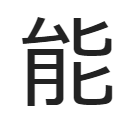#like yeah I can't get too annoyed at OP since they're probably just ignorant
Explore tagged Tumblr posts
Text
So I initially just wanted to add an "acktually, the dots mostly represent fire, not legs, and 熊 is also used to describe a big fire, isn't that neat! And please credit the Chinese language for the characters next time :D"
But my need to double check things made me dig a little deeper, and uh. That's not how it worked actually.
熊 is not 能 on legs.
能 WAS bear.

Look, a chonky fella with ears, legs and a little tail! That got stylized over the ages. Since OP has decided to skip over this not "too important" bit, I'm going to pick up slack and point at how the bear's legs became the two "匕"-s, the upper left part is the head, and the 月 radical, while meaning "moon” on its own, takes on a "flesh" vibe when it's part of a character. So the modern character is still a chonky fella with legs, but square.
What happens next is a bit blurry (since Baidu results are various levels of source: Just Trust Me), but people started using this word for “bear" to also express energy/ability and just. decided that 能 should exclusively mean that.
Using 熊 to mean "bear" has some element of chicken-and-egg-ness. Some places say that when people wanted a new bear character, they added fire under its original form to express how bears were warm, or could survive forest fires, and the "big fire" meaning came later. Others say that 熊 meant a big fire in the first place (a fire so strong it's like a bear, if you will), and when people decided they wanted 能 for themselves, the bear meaning got moved over.

From the above picture, you can tell that 熊 had some form of beastness pretty early on. The second character already shows the "能 over fire (火)" structure, and a cursory search says it existed in the hundreds of BC times.
So basically, humans invented a word for "bear", decided they didn't want to share an adjective with an animal (???like why), and lit a fire under it to chase away the original meaning. Now in modern times, 熊 can still mean a stubborn person, while another animal is used to describe impressive stuff: 牛, aka bull/cow. The animals still win.
Image source
Articles , all in Chinese
What I love about Japanese
Sometimes it’s frustrating. I’m learning it because I love anime and want to be able to engage with the culture, but all the shounen I-belive-in-my-friends inspiration can’t help you when you’re faced with a list of 1000 kanji to learn before you’re at the reading level of a five-year-old. Sometimes I wish I’d picked a language with a writing system that made sense.
But then once in a while something comes along that makes it all worth it.
Now this. This is the kanji for ability.

It’s a nice enough kanji, has some radicals of its own but isn’t too full of itself. Learning all about it isn’t too important, what you need to know is that this is the character for ability.
Now.
This.

This here is the kanji for bear. As in the animal, not the verb.
That’s right. According to the Japanese language, a bear is ability
ON LEGS
#languages#japanese#chinese#as much as I joked about it#I still don't know the ratio of amused/annoyed I should get at a post about how Japanese is so cool#and then only talks about Kanji without crediting its origin#you know like 漢字? Han (ie Chinese) words?#and ones that are still in active use in China no less#when there are many Kanji that Japanese is effectively preserving since they've fallen out of use in China#or words that Japanese has invented and passed back to Chinese eg telephone (!)#like yeah I can't get too annoyed at OP since they're probably just ignorant#and stuff like four dots = fire comes from learning Chinese as a kid#but then it goes to - so Japanese instructors and materials don't talk about this?#No mention that literally Han Words came from China?#Nothing about radicals?#Yeah children learn from rote#but are teen and adult beginner materials really not utilizing their higher cognitive ability and introducing these concepts#“the writing system doesn't make sense” my sibling in Yesu they took Chinese characters and split one language into three systems#and didn't bother telling learners about it
4K notes
·
View notes